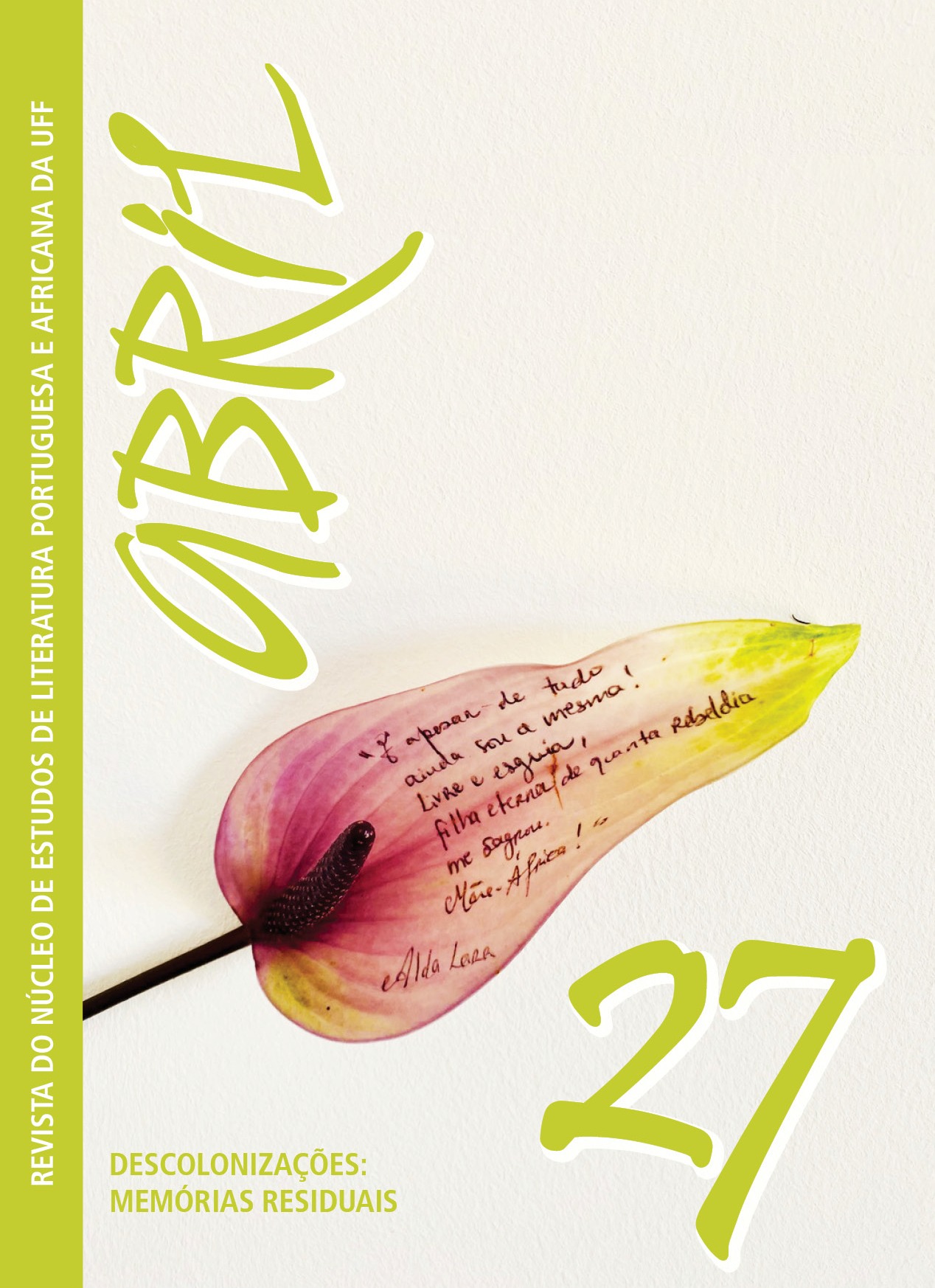A “inseparabilidade” dos trânsitos na obra de Djaimilia Pereira de Almeida
DOI:
https://doi.org/10.22409/abriluff.v13i27.50258Palavras-chave:
Inseparabilidade, Migração, Post-migrationResumo
A partir do conceito de “inseparabilidade”, publicado por Djaimilia Pereira de Almeida em ensaio homônimo como parte do livro Pintado com o pé (2019), este artigo propõe uma leitura de quatro obras da escritora, a saber: Esse cabelo (2015), Luanda, Lisboa, Paraíso (2018), As telefones (2020) e Maremoto (2021). Em comum, os quatro livros apresentam histórias de imigração, majoritariamente entre Angola e Portugal, não aquela ligada ao movimento dos retornados, já amplamente trabalhado pela literatura portuguesa, mas a de uma geração posterior ao período da descolonização, portanto, vivenciada já a partir da década de oitenta. Como indica o texto da orelha de suas obras (com exceção das duas últimas publicações, mudança editorial relevante), Djaimilia “nasceu em Angola, cresceu em Portugal, vive nos subúrbios de Lisboa”, portanto, sua inserção na literatura portuguesa contemporânea, a despeito do lugar marcado pelo mercado editorial, também merece atenção. Afinal, a reflexão sobre uma memória/história pública da colonização, para além dos testemunhos dos partícipes da guerra/da descolonização ou da segunda geração (pós-memória), que englobe a diáspora das populações das ex-colônias e ressignifique o espaço da antiga metrópole, ainda está por ser feita. Por fim, reflete-se sobre a necessidade de pensar a obra de Djaimilia Pereira de Almeida não apenas pela recorte pós-colonial, mas também passando pelo conceito de “post-migration” para compreender a sua escrita como uma memória outra na literatura portuguesa pós-25 de abril.
Downloads
Referências
ALMEIDA, Djaimilia Pereira de. Esse cabelo: a tragicomédia de um cabelo crespo que cruza fronteiras. Rio de Janeiro: Leya, 2017.
ALMEIDA, Djaimilia Pereira de. Luanda, Lisboa, Paraíso. Lisboa: Companhia das Letras, 2018.
ALMEIDA, Djaimilia Pereira de. “Inseparabilidade”. In: Pintado com o pé. Lisboa: Relógio D’água Editores, 2019, p. 125-193.
ALMEIDA, Djaimilia Pereira de. As telefones. Lisboa: Relógio D’água Editores, 2020.
ALMEIDA, Djaimilia Pereira de. Maremoto. Lisboa: Relógio D’água Editores, 2021.
ASH CRO FT, Bill; GRIFFITHS, Gareth; TIFFIN, Helen. The Empire writes back. New York: Routledge, 2010.
FRANCO, Roberta Guimarães. Portugalidade e pós-memória: configuração e desconstrução da identidade portuguesa no século XXI. In: CAMPOS, Laura Barbosa; CARRIZO, Silvia; MAGALHÃES, Pedro Armando (orgs). (Pós)-memória e transmissão na literatura contemporânea. Rio de Janeiro: ABRALIC, 2018, p. 153-166.
FRANCO, Roberta Guimarães. Memórias em trânsito: deslocamentos distópicos em três romances pós-coloniais. São Paulo: Alameda, 2019.
FRANCO, Roberta Guimarães (2020). Testemunhos em fragmentos: memórias do colonialismo português na peça Amores Pós-Coloniais. Gragoatá, 25(53), 993-1015. https://doi.org/10.22409/gragoata.v25i53.42957
HALL, Stuart. Da diáspora: identidades e mediações culturais. Tradução: Adelaine La Guardia Resende. Belo Horizonte: Editora UFMG, 2003.
HENRIQUES, Joana Gorjão. Racismo em português: o lado esquecido do colonialismo. Lisboa: Tinta da China, 2016.
MORR ISON, Toni. A origem dos outros: seis ensaios sobre racismo e literatura. Tradução: Fernanda Abreu. São Paulo: Companhia das Letras, 2019.
NEUMANN, Birgit. A representação literária da memória. Tradução: Marta Pacheco Pinto In: ALVES, Fernanda Mota Alves; SO ARES, Luísa Afonso; RO DRIGUES, Cristiana Vasconcelos (orgs). Estudos da memória: teoria e análise cultural. Famalicão: Edições Húmus, 2016, p. 267-278.
ONDJAKI. O livro do deslembramento. Lisboa: Editorial Caminho, 2020.
PETERSEN, Anne Ring; SCHR AMM, Moritz; WIEGAND, Frauke. Introduction – From Artistic Intervention to Academic Discussion. In: SCHRAMM, Moritz; MOSLUND, Sten Pultz; PETERSEN, Anne Ring. Regraming migration, diversity and the arts: the postmigrant condition. New York: Routledge, 2019, p. 3-10.
PETERSEN, Anne Ring. ‘Say It Loud!’ A Postmigrant Perspective on Postcolonial Critique in Contemporary Art. In: SCHRAMM, Moritz; MOSLUND, Sten Pultz; PETERSEN, Anne Ring. Regraming migration, diversity and the arts: the postmigrant condition. New York: Routledge, 2019, p.75 – 93.
RIBEIRO , Margarida Calafate. Viagens na minha terra de “outros” ocidentais. In: RIBEIRO , Margarida Calafate; RO THWELL, Phillip (orgs). Heranças pós-coloniais nas literaturas de língua portuguesa. Porto: Edições Afrontamento, 2019, p. 291-307.
SPIVAK, Gayatri Chakravorty. Pode o subalterno falar? Tradução: Sandra Regina Goulart Almeida; Marcos Pereira Feitosa; André Pereira Feitosa. Belo Horizonte: Editora UFMG, 2010.
Downloads
Publicado
Edição
Seção
Licença
Copyright (c) 2021 Abril – NEPA / UFF

Este trabalho está licenciado sob uma licença Creative Commons Attribution-NonCommercial 4.0 International License.
Autorizo a Revista Aabril - NEPA/UFF a publicar o artigo que ora submeto, de minha autoria/responsabilidade, caso seja aceito para publicação online. Declaro, ainda, que esta contribuição é original, que não está sendo submetida a outro editor para publicação, e assino a presente declaração como expressão da verdade.
Os trabalhos publicados no espaço virtual da Revista Abril serão automaticamente cedidos, ficando os seus direitos autorais reservados à Revista Abril. Sua reprodução, total ou parcial, é condicionada à citação dos autores e dos dados da publicação.

A Revista Abril utiliza uma Licença Creative Commons - Atribuição-NãoComercial 4.0 Internacional (CC BY-NC 4.0).









